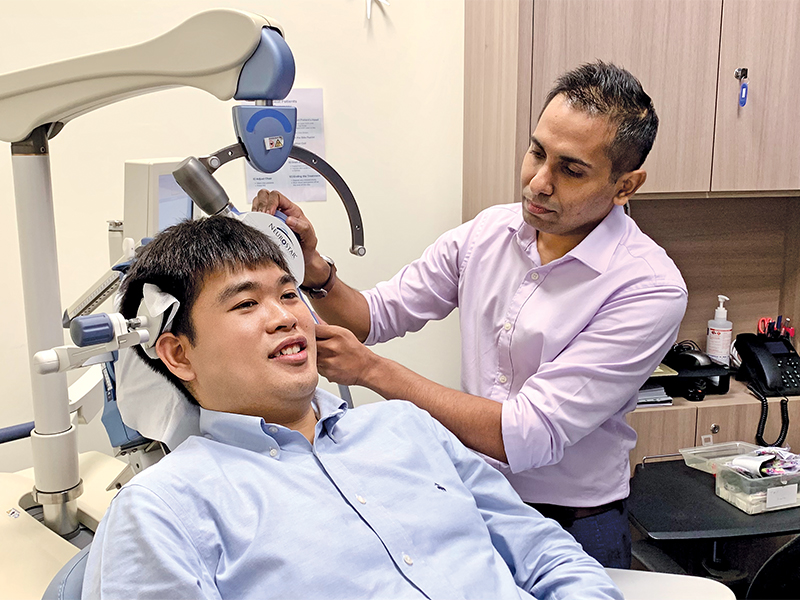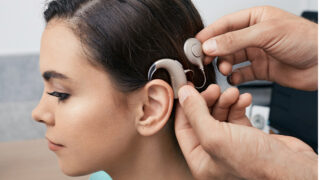Did you know that our brains can be rewired? Fairly new psychiatric treatments can encourage what’s known as neuroplasticity – and may help patients overcome severe mood disorders as a result. We asked DR SEAN DAVID from Promises Healthcare to tell us more.
What is neuroplasticity?
Neuroplasticity refers to the brain’s ability to reorganise itself by forming new neural connections to relearn different ways of doing things.

What psychiatric treatments can help rewire the brain?
Medications, psychotherapy and neurostimulation can all induce neuroplastic changes in the brain. Therapy approaches like Cognitive Behavioural Therapy (CBT) and Transcranial Magnetic Stimulation (TMS) can be combined to target the prefrontal cortex for improved cognitive control and emotional adjustment.
TMS can also be combined with other psychotherapeutic practices like mindfulness training. This targets the limbic network for better emotional function. The limbic system controls our behavioural and emotional responses, especially when it comes to those needed for survival – feeding, reproduction, caring for our young, and fight-or-flight responses.
Medications such as antidepressants adjust the levels of monoamine neurotransmitters such as serotonin, dopamine and noradrenaline, to improve synaptic signalling or communication between neurons.
How are neural networks related to mood disturbances?
Mood disturbances are increasingly understood as disorders of connectivity in neural networks linking the superficial to deeper layers of the brain. Functional brain imaging has shown dysfunction in cortical regions and brain circuits that are pivotal for executive functioning, regulation of emotions, reward processing and preservation of memory and cognition. They also link the nervous system to the endocrine system that mediates the body’s response to stress.
What is neurostimulation?
In the practice of psychiatry in Singapore, neurostimulation is the purposeful modulation of the brain’s nervous system using noninvasive measures to aid in the treatment of mental health conditions like mood disorders and psychosis. These therapies include Electroconvulsive Therapy (ECT) and repetitive TMS (rTMS).
How does rTMS work?
Based on Faraday’s Law of electro-magnetic induction, rTMS is able to stimulate brain neuronal circuits with tiny electrical currents induced by a changing magnetic field.
At Promises Healthcare, we use NeuroStar Advanced Therapy. It was the first TMS system to receive US Food and Drug Administration (FDA) approval in 2008 for adults with major depressive disorder. In May 2022, the US FDA approved the use of the NeuroStar TMS system for treating adult patients suffering from obsessive-compulsive disorder (OCD).
How does rTMS affect the brain?
Evidence suggests that it induces neuroplastic changes in these circuits, and helps readjust neurotransmitters like serotonin and dopamine. It also appears to exert a neuroprotective effect on the brain. Research has shown that rTMS decreases oxidative stress on the brain. TMS also boosts the levels of brain-derived neurotrophic factor, an important protein that encourages the growth of neurons in brain regions, improving learning and memory. The antidepressant properties of rTMS may also help in normalising the body’s neuroendocrine stress-response system.
How is it administered?
Magnetic pulses are delivered in “trains” at certain frequencies. “Fast” stimulation at a high frequency of 10Hz is used in the treatment of depression, whereas “slow” stimulation at a lower frequency of 1Hz is used in the treatment of anxiety disorders.
Furthermore, rTMS can be targeted at focused regions of the cortex for superior precision treatment of specific conditions. For example, rTMS at 1Hz to the right orbitofrontal cortex reduces intrusive obsessions in OCD.
How long does a session last and what does it feel like?
The treatment is performed with the patient seated comfortably at an inclined position in a specially designed chair. No anaesthesia is required, and the patient remains alert during the treatment.
Each session lasts for 37 minutes, and a TMS operator will be present throughout the session to ensure the patient is comfortable and safe. Earplugs will be provided. Patients may choose to listen to music or watch TV during the session. Promises clinic has a TMS room with a plasma TV and Netflix subscription!
What does the ideal rTMS treatment programme look like?
Sessions are carried out on weekdays four to five times per week over four to six weeks. A typical course consists of 20 to 30 sessions. Patients with recurrent depressive episodes who respond well may be suitable candidates for maintenance rTMS treatment sessions carried out weekly, fortnightly or even monthly.
Who are the best candidates for neurostimulation?
In particular, rTMS can be used in treatment-resistant depression and OCD. It’s reported that 30 to 40 percent of depressed patients may have inadequate responses to antidepressant medication treatment. The direct neuronal effects of rTMS may explain why it works well for this group of patients.
It’s also suitable for patients who are very sensitive to the side effects of psychotropic medications or who have concerns about ECT.
After commencing rTMS, improvement in mood and cognition may be seen in two to three weeks. Many patients are then able to effectively take part in talk therapy, resulting in their synergistic combination effects on neuroplasticity.
Promising research is ongoing for the clinical application of TMS in the treatment of post-traumatic stress disorder (PTSD), addictions, chronic pain, insomnia and many other neurological disorders.
About the doctor and the clinic
Dr Sean David Vanniasingham is experienced in general psychiatry, addiction medicine and neurostimulation treatment. He is a firm believer in a bio-psycho-social model approach in the holistic and recovery-oriented care of his patients. He’s a fellow at the Academy of Medicine Singapore and is currently serving as an executive committee member of the Singapore Psychiatric Association.
Promises Healthcare is a multidisciplinary mental health and addictions clinic. The team of psychiatrists, psychologists, therapists and executive coaches also includes a rehabilitation physician and nutritionist. Together, they take on a diverse and multidisciplinary approach to treatment. The care and wellbeing of patients is at the heart of the service, and treatments are based on the latest clinically proven protocols in the field of neuroscience and psychology.
Promises Healthcare is at #09-22/23, #09-18 & #11-16 Novena Medical Center, 10 Sinaran Drive. Contact the team at 6397 7309.
This article first appeared in the November 2022 edition of Expat Living. You can purchase the latest issue or subscribe, so you never miss a copy!





